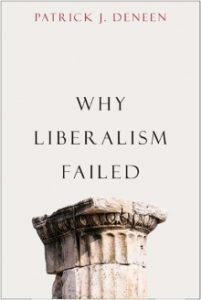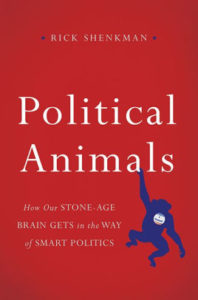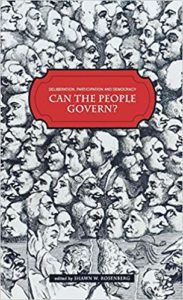 To challenge liberalism is to not merely engage in ordinary political argumentation. It is to call into question the entire operating system that defines the world’s democracies. It is, by its nature, a radical claim, writes for Vox:
To challenge liberalism is to not merely engage in ordinary political argumentation. It is to call into question the entire operating system that defines the world’s democracies. It is, by its nature, a radical claim, writes for Vox:
The rise of such a challenge to liberalism has highlighted how the liberal status quo has failed to deliver, particularly in the wealthy West. Across the OECD, the top 10 percent makes over nine times per year as much as the bottom 10 percent. Metrics of trust in a range of governmental institutions — legislatures, courts, civil service — are falling across advanced democracies. In the United States specifically, deaths from alcohol abuse, drug overdose, and suicide have reached all-time highs.
The intellectual critics of liberalism opponents do not typically challenge democracy itself. But they are united in believing that American liberalism as currently constituted is past its expiration date, that it is buckling under the weight of its contradictions. Critics on the left and right are waging war on liberalism. And liberals don’t seem to have a good defense, Beauchamp adds:
- On the right, the anti-liberals [like Patrick j. Deneen, above] locate the root of the problem in liberalism’s social doctrines, its emphasis on secularism and individual rights. In their view, these ideas are solvents breaking down America’s communities and, ultimately, dissolving the very social fabric the country needs to prosper…..
- Left anti-liberals, by contrast, pinpoint liberal economic doctrine as the source of our current woes. Liberalism’s vision of the economy as a zone of individual freedom, in their view, has given rise to a deep system of exploitation that makes a mockery of liberal claims to be democratic — an oppressive system referred to as “neoliberalism.”
 As if democracy didn’t face enough challenges, on top of the authoritarian resurgence, poor performance, institutional inertia and inadequacy, it’s also claimed that democratic governance is incompatible with human psychology.
As if democracy didn’t face enough challenges, on top of the authoritarian resurgence, poor performance, institutional inertia and inadequacy, it’s also claimed that democratic governance is incompatible with human psychology.
“In well-established democracies like the United States, democratic governance will continue its inexorable decline and will eventually fail,” a prominent analyst told this summer’s International Society of Political Psychologists’ annual meeting in Lisbon, notes Rick Shenkman, founder of George Washington University’s History News Network, and the author of Political Animals: How Our Stone-Age Brain Gets in the Way of Smart Politics (Basic Books).
So why is one of the lions of the profession, 68-year-old Shawn Rosenberg, who made his name back in the 1980s with a study that disturbingly showed that many voters select candidates on the basis of their looks, predicting the end of democracy now? he asks in POLITICO:
 He has concluded that the reason for right-wing populists’ recent success is that “elites” are losing control of the institutions that have traditionally saved people from their most undemocratic impulses. When people are left to make political decisions on their own they drift toward the simple solutions right-wing populists worldwide offer: a deadly mix of xenophobia, racism and authoritarianism….The irony is that more democracy—ushered in by social media and the Internet, where information flows more freely than ever before—is what has unmoored our politics, and is leading us towards authoritarianism.
He has concluded that the reason for right-wing populists’ recent success is that “elites” are losing control of the institutions that have traditionally saved people from their most undemocratic impulses. When people are left to make political decisions on their own they drift toward the simple solutions right-wing populists worldwide offer: a deadly mix of xenophobia, racism and authoritarianism….The irony is that more democracy—ushered in by social media and the Internet, where information flows more freely than ever before—is what has unmoored our politics, and is leading us towards authoritarianism.
“In sum, the majority of Americans are generally unable to understand or value democratic culture, institutions, practices or citizenship in the manner required,” adds Rosenberg, editor of Deliberation, Participation and Democracy: Can the People Govern? “To the degree to which they are required to do so, they will interpret what is demanded of them in distorting and inadequate ways. As a result they will interact and communicate in ways that undermine the functioning of democratic institutions and the meaning of democratic practices and values.” RTWT
And talking of the politics of emotion….
 How did the phenomenon of nostalgia arise and spread so rapidly? How can nostalgia explain the populist upsurge? What are the consequences for the transatlantic relationship and the U.S.–UK relationship in particular? And perhaps most importantly, how can we combat its dangerous misconceptions about our reality? The German Marshall Fund of the United States asks.
How did the phenomenon of nostalgia arise and spread so rapidly? How can nostalgia explain the populist upsurge? What are the consequences for the transatlantic relationship and the U.S.–UK relationship in particular? And perhaps most importantly, how can we combat its dangerous misconceptions about our reality? The German Marshall Fund of the United States asks.
GMF) is hosting a discussion with Marta Dassù, one of the co-authors of Anglo Nostalgia: The Politics of Emotion in a Fractured West and senior advisor for European Affairs at the Aspen Institute; Amanda Sloat, Robert Bosch senior fellow at the Brookings Institution; Edward Luce, columnist and commentator for the Financial Times; and Walter Russell Mead, Ravenel B. Curry III distinguished fellow in strategy and statesmanship at the Hudson Institute.
Monday, September 23, 2019 | 2:30 – 4:00 p.m. RSVP by email to Nicola Lightner at nlightner@gmfus.org.







